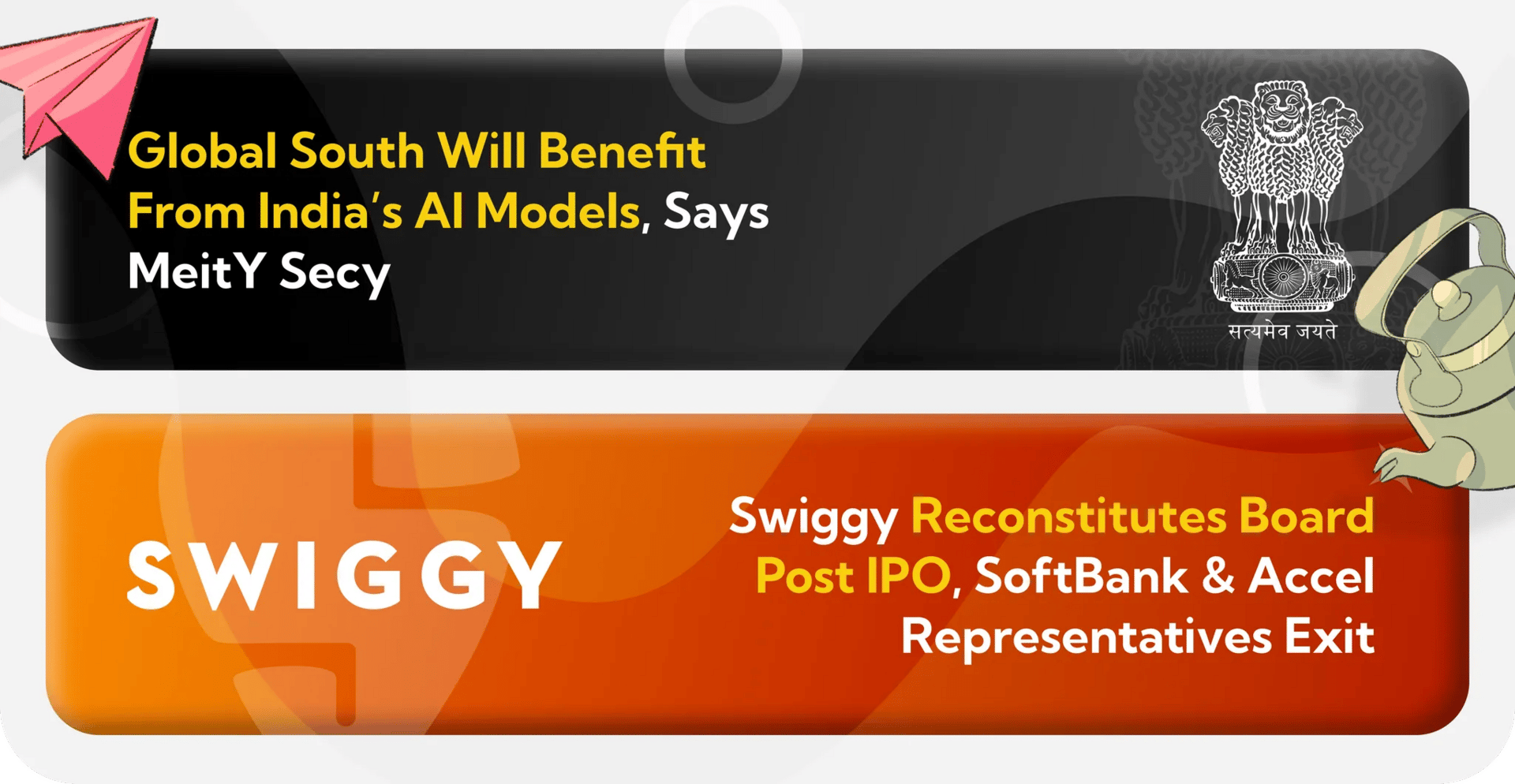- Startup Chai
- Posts
- Myntra's FDI Troubles, Swiggy’s Refresh, and Noise Eyes Overseas
Myntra's FDI Troubles, Swiggy’s Refresh, and Noise Eyes Overseas
Plus Centre Bans OTT Platforms, and fundraising news about MoEngage and Livspace

When the Enforcement Directorate (ED) goes after one of India’s top fashion platforms for foreign investment violations worth ₹1,654 crore, it’s not just a regulatory skirmish, it’s a wake-up call. The agency’s recent complaint against Myntra Designs Pvt Ltd and its directors under Section 16(3) of FEMA accuses the company of using a proxy structure to bypass India’s strict foreign direct investment (FDI) rules. At the center of this case lies a debate that’s been simmering for years: how far can companies stretch policy loopholes before it breaks into a violation?
Let’s break down the core allegation. The ED claims that instead of operating as a legitimate wholesale business, Myntra routinely sold the majority of its goods to a group company, Vector E-Commerce Pvt Ltd. This entity, in turn, sold directly to consumers via online platforms. Under the FDI rules for wholesale (or “cash and carry”) businesses, only up to 25% of total sales can be made to group companies. Myntra, the ED argues, consistently exceeded this limit and used this structure to disguise business-to-customer (B2C) retail as business-to-business (B2B) wholesale. This, according to the complaint, violated both FEMA provisions and the FDI policy in effect since 2010.
This isn’t an isolated playbook. India’s e-commerce giants have long walked the tightrope between scale and regulation. Flipkart, Myntra’s parent company, has repeatedly restructured its operations over the past decade to stay within the gray zones of evolving policy. Amazon has done the same, relying on seller entities like Cloudtail and Appario - many of which had indirect links to Amazon - to navigate inventory ownership restrictions under India’s marketplace rules. Both companies have been under ED investigations in the past for similar reasons.
Globally, these companies have had their share of run-ins with regulators. Amazon has faced antitrust scrutiny in the US and EU for allegedly favoring its own products and sellers. Walmart, which owns Flipkart, was embroiled in a major bribery investigation in Mexico in 2012 and has had to clean up governance across multiple markets. The Myntra case fits into this broader pattern: when companies grow fast and operate across jurisdictions, they often test how far rules can be bent - especially in markets with regulatory opacity.
India, with its massive and growing consumer base, has been particularly vulnerable to such tactics. FDI rules have always tried to strike a delicate balance: attract foreign capital, but not at the cost of harming domestic retailers. That’s why foreign investment in multi-brand retail is heavily restricted. By contrast, wholesale trading was allowed with fewer hurdles. The ED’s case essentially argues that Myntra used this easier route to enter a space where it wasn’t legally permitted.
There’s more at stake here than just one company’s compliance record. First, the ED hasn’t just gone after the entity - it’s named directors personally. That’s a sharp shift in tone from earlier cases, where companies could settle matters quietly behind closed doors. Second, the complaint covers past activities, implying that even legacy structures aren’t immune to fresh scrutiny. This creates uncertainty for many digital-first businesses that relied on aggressive legal interpretation during their scaling years.
Startups that raised funds between 2014 and 2019 often did so on promises of growth, not always profit or regulatory compliance. Investors backed models that could scale, sometimes without fully vetting the legality of operational shortcuts. But with enforcement catching up and India positioning itself as a rule-based, investor-friendly economy, that old playbook is under threat. Regulators are saying: scale is no longer an excuse.
Ironically, while India has created globally admired digital public goods - UPI, ONDC, DigiLocker - it still struggles with enforcement clarity. The Myntra case will likely reignite debates about the gap between written laws and business practices. But the bigger concern is whether such cases will lead to knee-jerk reactions, where investor sentiment takes a hit, or if it will push for cleaner, transparent structuring from the start.
Let’s go through what else is happening in Indian startup world - Grab your simmering cup of StartupChai.in and unwind with our hand-brewed memes.

“Waqt Rehte Sudharna Tha”: Centre bans 25 OTT platforms for obscene and unlawful content
The Centre just hit pause on 25 OTT platforms, think Ullu, ALTT, and a slew of lesser-known apps, for streaming content deemed obscene and unlawful.
From risqué plots to problematic portrayals, the Ministry of I&B says enough is enough. With ISPs now pulling the plug, India’s streaming space is facing its boldest censorship move yet.
Read more here

“Kehte Hai Hume Pyaar Se Indiawale”: Global South Will Benefit From India’s AI Models, Says MeitY Secy
India’s AI play isn’t just desi, it’s diplomatic. MeitY Secretary Alkesh Kumar Sharma says India’s multilingual, open-source AI models could empower the Global South, not just Big Tech elites.
With the UN nodding in approval, India's collaborative coding might just be the bridge between Silicon Valley and underserved voices.
Read more here


“Aaiye Aapka Intezaar Tha”: Swiggy Reconstitutes Board Post IPO, SoftBank & Accel Representatives Exit
Swiggy’s post-IPO menu just got a boardroom refresh as SoftBank and Accel have exited, while Noon CEO Faraz Khalid grabs a seat as an independent director.
After listing at a mild 5% premium last November, the food delivery giant seems hungry for fresh perspectives. Looks like Swiggy’s next course is all about global flavour with leaner governance.
Read more here

“Make Some Noise For Desi Boyzz”: Bose-Backed Noise Eyes Overseas Markets To Become A Global Brand
Homegrown wearable brand Noise is tuning into the global stage, hoping to amplify its reach beyond India with Bose’s backing in its corner.
With ₹1,431 Cr in FY24 revenue, it’s already made quite some noise domestically. Now, cofounder Gaurav Khatri says the world’s next, powered by desi design and sharp consumer playbooks.
Read more here

“All In One”: Namma Yatri Integrates Metro Bookings & Other Features For Smoother Commute
Bengaluru’s commute just got a techy upgrade as Namma Yatri now lets you book metro tickets and plan multi-modal trips in one smooth tap.
Think of it as your personal transit sidekick, guiding every step of your city slog in real time. The feature’s rolling out gradually, so hang tight, your seamless ride is on the way.
Read more here

MoEngage is reportedly eyeing a $200M funding boost from ChrysCapital, A91 Partners, and Goldman Sachs as it plans a reverse flip to India. The move aligns with its IPO ambitions and comes with a hefty $100M relocation tab.
Read more hereLivspace’s parent has pumped another ₹362 Cr into its Indian arm, taking this year’s tally to ₹789 Cr. It’s all part of the home interiors giant’s big move back to India ahead of a 2025-26 IPO blueprint.
Read more here
How did today's serving of StartupChai fare on your taste buds? |